Qbo Set Up Classes for Tracking Programs and Grants
Both have a lot going for them, but there are some key differences. Learn which one fits the size, type, and needs (and budget) of your business.
Advertiser Disclosure: Our unbiased reviews and content are supported in part by affiliate partnerships, and we adhere to strict guidelines to preserve editorial integrity.
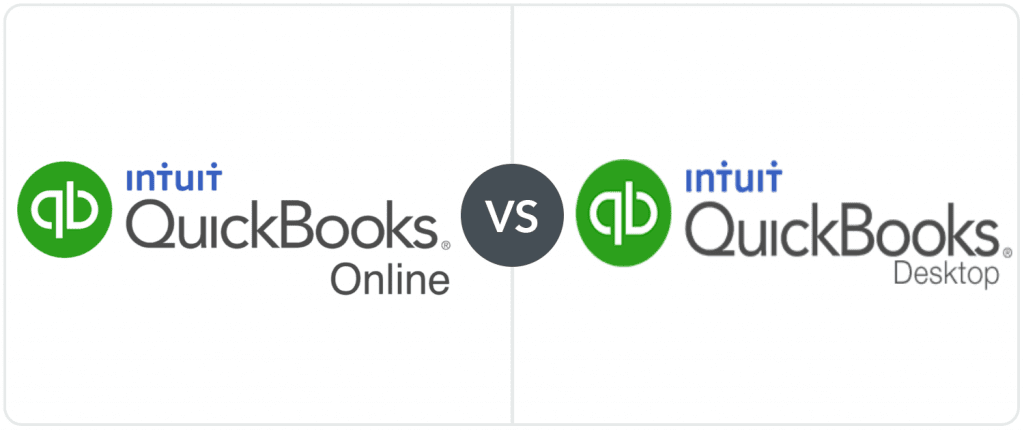
When the same company offers two good accounting software products, how can you choose between them? That's the question when it comes to QuickBooks Online and QuickBooks Desktop.
In this post, we're exploring the differences between QuickBooks Online vs. Desktop 2021. We will compare each product's features, pricing, user experience, customer support, reputation, and more so that you can confidently choose which software is better for your business.
| QuickBooks Online | QuickBooks Desktop | |
|---|---|---|
| Pricing | $25-$180/month | $349.99/year+ |
| Installation Method | Cloud-based | Locally-installed |
| Number Of Users | 1-25 | 1-3 |
| Key Features | 650+ integrations, easy to use, advanced invoicing | Strong accounting features, advanced reporting, 240+ integrations |
QuickBooks Online VS Desktop Comparison: Quick Summary
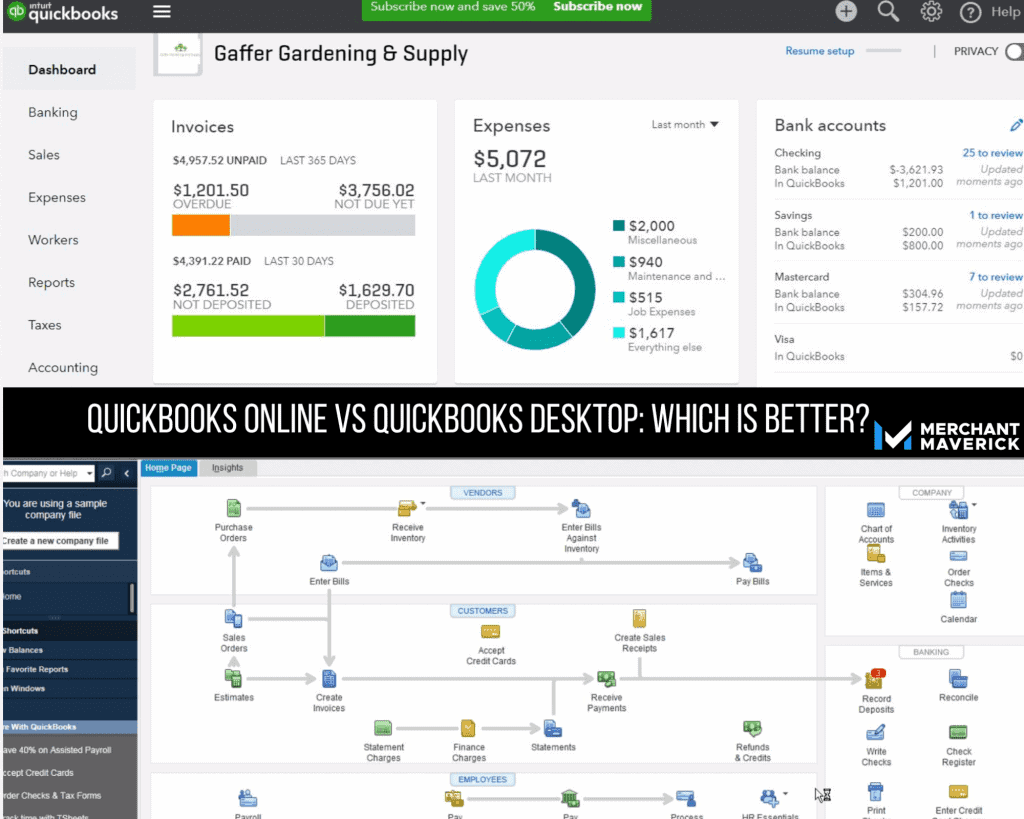
When you compare Intuit's two most popular products, QuickBooks Online vs. Desktop, both have strong accounting features, but there is a key difference — QuickBooks Online is a cloud-based software with monthly pricing, and QuickBooks Desktop is locally-installed with an annual license pricing model.
QuickBooks Online: Best For Mobility & Usability
You've probably heard of QuickBooks accounting software, but what is QuickBooks Online? QuickBooks Online, or QBO, is Intuit's cloud-based accounting product. QuickBooks Online is designed specifically for small businesses; however, the new QuickBooks Online Advanced plan makes the software scalable for larger businesses as well. The software offers a robust feature set, strong accounting, online payroll, attractive invoices, 650+ integrations, and a unique lending feature.
QBO is also significantly easier to learn and use than QuickBooks Desktop. Since the software is cloud-based, QBO works anywhere you have an internet connection, and mobile apps help you manage your business on the go.
Pros
- Cloud-based
- Easy to use
- Monthly pricing
- Strong features
- Built-in lending
- 650+ integrations
Cons
- Customer support
- More expensive than other SMB products
- Fewer features than Desktop
- No sales orders
QuickBooks Desktop: Best For Traditional & Complex Accounting
QuickBooks Desktop is locally-installed software that is a top choice among business owners and accountants. There are three different QuickBooks Desktop products: QuickBooks Desktop Pro, QuickBooks Desktop Premier, and QuickBooks Desktop Enterprise.The main difference between the three is that Pro is designed for small businesses, Premier for medium businesses, and Enterprise for large businesses. As such, each plan progresses in terms of available users and features.
Each desktop version of QuickBooks offers incredible accounting tools and extensive features, including expense tracking, budgeting, and job costing, more than 240 integrations, and positive customer reviews. It's worth noting that QuickBooks Desktop is only available on Windows operating systems. Mac users will need to look at QuickBooks for Mac for a locally-installed Mac-based QuickBooks option.
Pros
- Strong features
- Traditional accounting
- Advanced reporting
- Potentially more secure
- 240+ integrations
Cons
- Windows-only
- Customer support
- Can be expensive
- Fewer automations than QBO
The Key Differences Between QuickBooks Online & QuickBooks Desktop
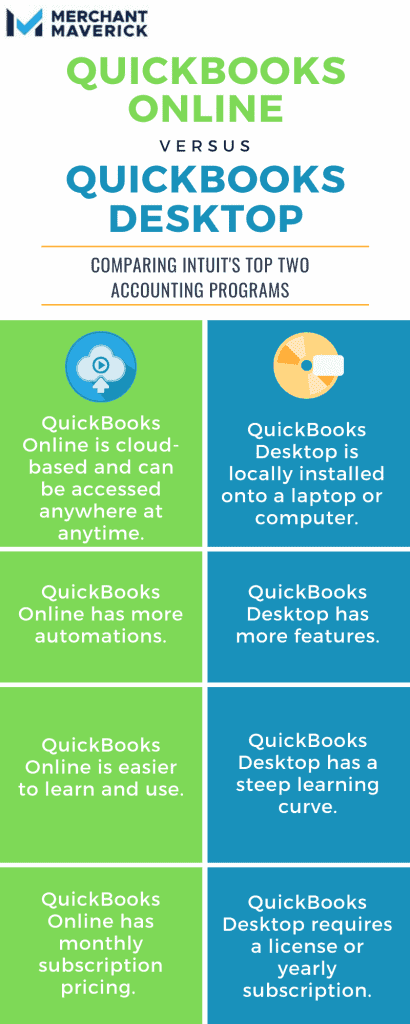
We've analyzed the main components of each software — features, pricing, ease of use, customer support, reviews and complaints, and integrations. Now let's get into the key differences between QuickBooks Online and Desktop that every small business owner should consider.
Here are the eight main differences between QuickBooks Desktop vs. QuickBooks Online:
- QuickBooks Online Is Cloud-Based Software: The biggest difference between these two QuickBooks products is that QuickBooks Online is cloud-based and runs using the internet, while QuickBooks Desktop is downloaded and installed on a computer. That means that QuickBooks Desktop doesn't require the internet to work, but it also means that you can't access the software remotely (unless you pay extra for hosting).
- QuickBooks Online Has Built-In Security: Because QuickBooks Online is cloud-based, the security is taken care of for you by Intuit. On the other hand, QuickBooks Desktop is locally-installed, so while this program has the potential to be more secure, you are responsible for taking those security measures yourself.
- QuickBooks Desktop Requires An Annual Subscription: Another key difference is that QuickBooks Online has a monthly SaaS pricing structure, whereas QuickBooks Desktop has an annual subscription pricing structure.
- QuickBooks Online Supports More Users: QuickBooks Online allows up to 25 users depending on your pricing plan, and you can have an unlimited number of time-tracking only users. Adding another user to QuickBooks Desktop Pro will run you an additional $200/year per user, and the software caps out at three users max. QuickBooks Desktop Premier caps out at five users, and QuickBooks Desktop Enterprise caps out at 40 users (both require even steeper costs for additional users). All of these QuickBooks products offer strong user permissions.
- QuickBooks Desktop Has More Developed Features: While QuickBooks Online and Desktop have many of the same features, QuickBooks Desktop's features are usually more developed.
- QuickBooks Online Has More Automations: QuickBooks Online has far more automations than QuickBooks Desktop, which allows business owners to manage their books more efficiently and quickly. And because QBO is cloud-based, all of your information (such as bank or credit card data) is synced in real-time.
- QuickBooks Desktop Is Harder To Use: Because of its feature set and focus on traditional accounting, QuickBooks Desktop has a much steeper learning curve than QBO (and the UI isn't as modern or simple to navigate).
- QuickBooks Online Offers Built-In Lending: Another big difference between QuickBooks Online vs. QuickBooks Desktop is that only online users have access to QuickBooks Capital.
Choose QuickBooks Online If…
- You want software that is easy to use and learn
- You want to access your accounting remotely with mobile apps
- You want time-saving automations and integrations
- You want to use payment processing integrations for online invoice payments
- You need international invoicing
- You want access to QuickBooks Capital lending
Chose QuickBooks Desktop If…
- You want locally-installed software accounting software
- You need the industry-specific features of QuickBooks Premier or QuickBooks Enterprise
- You need sales orders
- You have very complex accounting
QuickBooks Online VS Desktop: Pricing
| Price | Best For | |
|---|---|---|
| QuickBooks Online | $25+/month | Small to medium businesses with up to 25 users |
| QuickBooks Desktop Pro | $349.99+/year | Small to medium businesses with 1 to 3 users |
| QuickBooks Desktop Premier | $549.99+/year | Medium and niche industry businesses with 1 to 5 users |
| QuickBooks Desktop Enterprise | $1,655+/year | Medium to large businesses with up to 40 users |
QuickBooks Online and QuickBooks Pro have two different pricing structures.
QuickBooks Online has a monthly SaaS pricing structure. Four pricing plans are available, ranging from $25-$180/month (with an additional $45+/month for payroll).
QuickBooks Desktop has a yearly subscription pricing model. The prices for QuickBooks Desktop vary depending on which version of the software you opt for: QuickBooks Pro, QuickBooks Premier, or QuickBooks Enterprise.
QuickBooks Pro is geared toward small to medium businesses and starts at $349.99/year for a single user. QuickBooks Premier is suited for medium and niche industry businesses and starts at $549.99/year for a single user. QuickBooks Enterprise is designed for large businesses or small enterprises and starts at $1,655/year. You can add payroll, additional users, and cloud hosting for additional fees.
It's hard to say which software is cheaper because there are so many variables. But there are some general guidelines to know which version might be the one for your business (and your budget).
- QuickBooks Desktop Pricing: If you have a single user and want locally-installed software with advanced features, QuickBooks Pro is likely the better option. However, the extra costs for QuickBooks Desktop add up quickly, particularly if you have more than one user.
- QuickBooks Online Pricing: If you have multiple users and use live bank feeds, QuickBooks Online will probably be a better bet. The monthly pricing structure also works better for small businesses that don't have the cash flow for yearly subscriptions.
We recommend crunching the numbers to decide whether the online version or the desktop version of QuickBooks is right for your specific business.
QuickBooks Online VS Desktop: Features
| Feature | QuickBooks Online | QuickBooks Desktop |
|---|---|---|
| Invoicing | ✔ | ✔ |
| Estimates | ✔ | ✔ |
| Client Portal | ✔ | ✔ |
| Contact Management | ✔ | ✔ |
| Bank Reconciliation | ✔ | ✔ |
| Expense Tracking | ✔ | ✔ |
| Chart Of Accounts | ✔ | ✔ |
| Accounts Payable | ✔ | ✔ |
| Inventory | ✔ | ✔ |
| Time Tracking | ✔ | ✔ |
| Project Management | ✔ | ✔ |
| Budgeting | ✔ | ✔ |
| Tax Support | ✔ | ✔ |
| Built-In Lending | ✔ | X |
| Reporting | ✔ | ✔ |
| *some features only available on select plans |
Both QuickBooks Online and QuickBooks Desktop offer a large number of features. While they share many of the same features, QuickBooks Desktop's features are often more developed, except when it comes to invoicing. Even though QB Desktop has more comprehensive features in general, there are some key features that only QuickBooks Online has, including lending and international invoicing. So it really comes down to which features your business values most.
Here's a breakdown of how each program's specific features compare.
Accounting
QuickBooks Online and QuickBooks Desktop operate on true double-entry accounting principles and have both accrual and cash-basis accounting. Each offers a detailed chart of accounts, journal entries, bank reconciliation, accounts payable, accounts receivable, and the basic reports needed to run a company. However, QuickBooks Desktop offers better reporting and supports more complex accounting.
One of the biggest differences here is that QuickBooks Online now offers a bookkeeping service called QuickBooks Live Bookkeeping, where you can pay for professional support from certified QBO accountants and CPAs. For small business owners new to the accounting scene, this service may bring some much-needed peace of mind when it comes to managing your books and filing small business taxes.
Invoicing
When it comes to invoicing, QuickBooks Online blows QuickBooks Desktop out of the water. QuickBooks Online makes it easy to create beautiful custom invoices. The designs are clean and modern, making it easy for customers to understand their invoices. Here's an example of what a QBO invoice looks like:
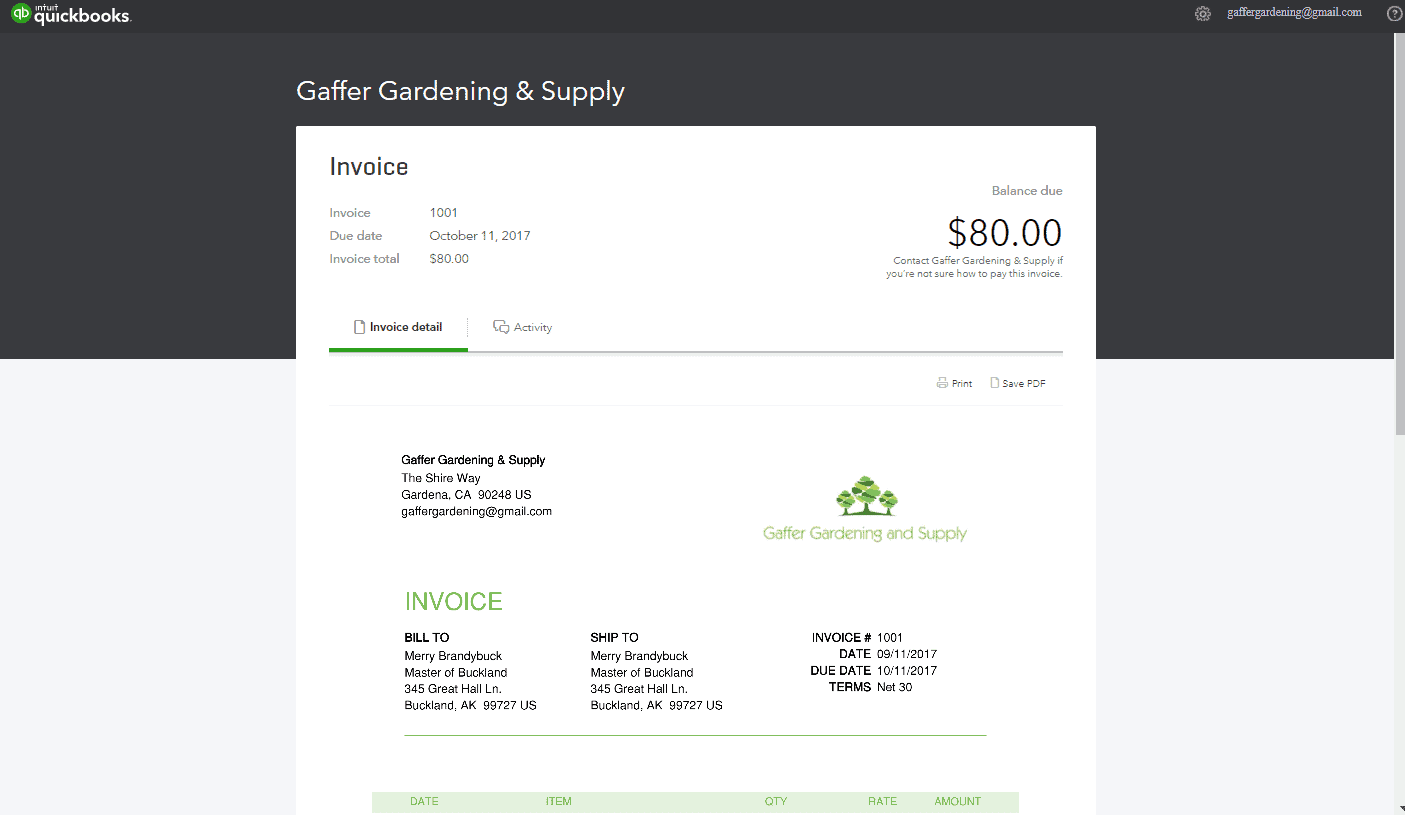
QuickBooks Desktop's invoices are cluttered, outdated, and much harder to customize. Here's what an invoice made with QuickBooks Desktop looks like:
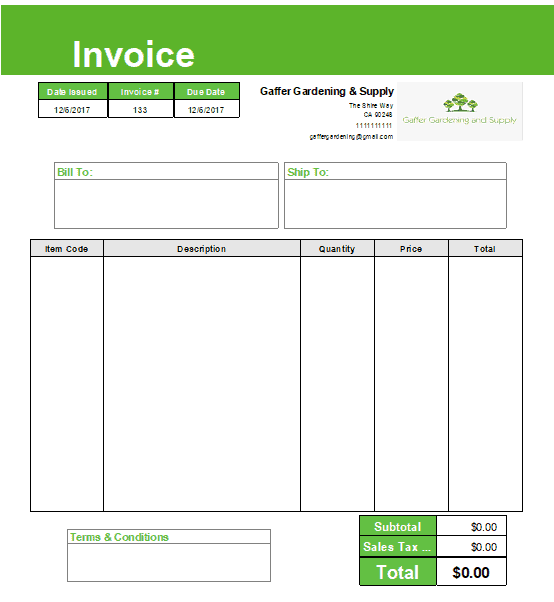
In addition to having better invoice template designs, QuickBooks Online also has better automations:
- Recurring invoices
- Batch invoicing and progress invoicing
- Sending invoice reminders to late-paying customers
- The ability to auto-schedule invoices
- A client portal where customers can make online payments
- Invoice tracking so that you can easily see if a client has received, viewed, or paid their invoice
- Having your invoices translated into six different languages for international customers
With QuickBooks Desktop, you can set recurring invoices, send payment reminders, send batch invoices, and track invoices, but you'll miss out on many of the other modern, cloud-based automations that QBO provides.
Contact Management
While QuickBooks Online and QuickBooks Desktop offer contact management, only QuickBooks Desktop allows you to manage and track leads as well as contacts.
Reporting
QuickBooks Online offers over 80 reports depending on the plan you choose, whereas QuickBooks Desktop Pro has over 130 reports. QuickBooks Desktop Premier and Quickbooks Desktop Enterprise have even more reports (especially if you opt for the industry-specific versions of these programs). Both include the basic reports you'd expect to find with accounting software, such as a balance sheet, a Profit & Loss report, a cash flow statement, etc.
Payroll
With QuickBooks Online, you can add QuickBooks Online Payroll starting at $45/month. Read our full Intuit Online Payroll Review for more information. If you go with QuickBooks Desktop Pro, you can purchase a payroll add-on for $50/month or $500/year. Additionally, you may opt to subscribe to QuickBooks Desktop Pro Plus + Payroll, which includes QuickBooks Desktop Pro software plus Enhanced Payroll. This plan starts at $849.99/year.
QuickBooks Premier also has a payroll add-on, or you can purchase the QuickBooks Premier + Payroll annual plan. All QuickBooks Enterprise plans include payroll.
Lending
QuickBooks has a lending service called QuickBooks Capital. This service offers financing for small business owners who need working capital to manage their cash flow better. QuickBooks Capital is only available to QuickBooks Online users.
Sales Orders
If your business needs sales orders, QuickBooks Desktop is your only option. Although Intuit has talked about adding sales orders to QuickBooks Online, this feature is only available with QuickBooks Desktop products at this time.
Industry-Specific Features
One unique aspect of QuickBooks Desktop Premier and QuickBooks Desktop Enterprise is that you can opt for any industry-specific version of the software instead of the standard version. These industries include:
- General contractor
- Manufacturing and wholesale
- Nonprofit
- Accountant
- Professional services
- Retail
These versions give business owners more features and reports geared toward their industry. You can learn more in our post, A Quick Guide To The 6 Industry-Specific Editions Of QuickBooks Enterprise.
Mobile Apps
One big drawback of QuickBooks Pro in the past was that it didn't have mobile apps. Fortunately, with the introduction of QuickBooks Desktop 2022, a mobile app is now available. QuickBooks Online also has mobile apps for iOS and Android.
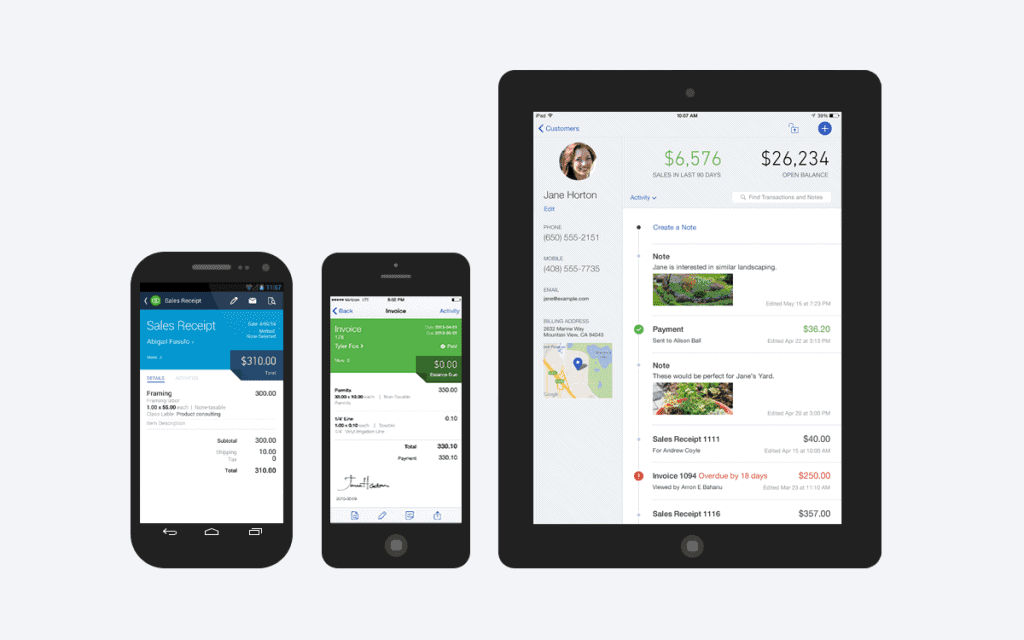
Integrations
Both QuickBooks Online and QuickBooks Pro offer a good number of helpful integrations and add-on products. However, QuickBooks Online offers over 650 integrations to QuickBooks Pro's 240+ integrations.
In addition to having more integrations, QuickBooks Online also hasbetter integrations. QBO's integrations cover more business needs and include multiple payment gateway options. In contrast, QuickBooks Desktop offers hardly any payment gateways, making it difficult for the modern merchant to accept online invoice payments easily.
Customer Service
Okay, let's be honest. Customer service has never been Intuit's strong suit. Both QuickBooks Online and QuickBooks Pro and Premier have notoriously poor customer support (QuickBooks Enterprise support has better priority support).
The company has updated its help centers to be more user-friendly, but there's still no email support. Both options, however, are working to reduce long hold times on the phone by now offering a callback feature.
Is QuickBooks Online Or QuickBooks Desktop Easier To Use?
The online version of QuickBooks is much easier to use than the desktop version.
One of the most common complaints about QuickBooks Desktop is its steep learning curve. Accountants often find QuickBooks Pro and Premier to be more traditional, but you don't have to be an accountant or professional bookkeeper to learn QuickBooks Online. Granted, you don't have to be an accountant to learn QuickBooks Desktop either, but if you are new to accounting, you will need a lot of time to learn the program.
QuickBooks Online VS Desktop Reviews: Which Do Users Like Better?
Both programs have their share of positive and negative reviews, although, in comparison, QuickBooks Online has received more complaints. Some of the most common criticisms are about:
- Limited mobile apps
- Slow run time
- Bugs
- Poor customer support
Many users also complain that QuickBooks Online doesn't compare to QuickBooks Pro in terms of features and quality. However, the majority of reviews are positive, with QuickBooks Online receiving 4.27/5 stars (based on 4,400+ reviews) on Software Advice and 4/5 stars (based on 2,600+ reviews) on G2. QuickBooks Online is praised for its mobility, ease of use, feature selection, time-saving automations, and integrations.
The most common complaints surrounding QuickBooks Pro include:
- Steep learning curve
- Expensive pricing
- Poor customer service
However, most users still view Quickbooks Desktop favorably, and the product receives high marks on most customer review sites. The software receives 4.3/5 (based on 1,300+ reviews) on Software Advice and 8.3/10 (based on 700+ reviews) on TrustRadius. QuickBooks Pro is praised for its strong accounting, ample features, reliability, and reporting.
Overall, QuickBooks Pro reviews are more favorable, but both user bases have good and bad things to say about each product.
QuickBooks Online VS Desktop Comparison: The Bottom Line
Both QuickBooks Online and QuickBooks Desktop are capable programs with strong accounting features. Each software has its highs and lows.
With QuickBooks Online, users receive many of the same great features while gaining the mobility of cloud-based software. QuickBooks Online is easier to use and has more automations, more integrations, better invoicing, and a unique built-in lending feature. The downsides are the lack of sales orders, lead management, and other complexities that loyal Desktop users may miss (such as customizable letter templates, a built-in calendar, and even spellcheck).
With QuickBooks Desktop, users receive some of the most developed accounting tools on the market. The software offers comprehensive features, unique touches (such as lead management and sales orders), industry-specific versions of the software, and the potential to be more secure. The downsides are that QuickBooks Desktop lacks the mobility of QBO, has few automations, doesn't offer lending or payment gateway integrations, and has a steep learning curve (although the software is well-organized and gets easier to navigate with time).
Ultimately, the real deciding factor is your specific business's size, type, and needs. Whichever you choose, our comprehensive reviews can help you make an informed decision during your hunt for the perfect accounting software. Read our full QuickBooks Online Review and QuickBooks Pro Review for more details about each software.
FAQs About QuickBooks Online & Desktop
Is QuickBooks Online better than Desktop?
QuickBooks Online is better for business owners who want easy-to-use cloud-based accounting that includes anywhere online access, mobile apps, and tons of integrations with other business apps. QuickBooks Desktop is better for small to large-sized businesses that have complex accounting needs and require more customizable features.
What's the difference between QuickBooks Online and QuickBooks Desktop Pro?
QuickBooks Online is a software as a service accounting program that is hosted online, while QuickBooks Desktop is a locally-installed accounting program with a yearly subscription pricing model.
Both offer strong accounting, though QuickBooks Desktop has more features and is more customizable, whereas QuickBooks Online has more automations and is easier to learn and use.
Is QuickBooks Online or QuickBooks Desktop cheaper?
It depends! QuickBooks Online has a cheaper monthly cost and is more affordable if you have a lot of employees who will be using the software. QuickBooks Desktop Pro may be cheaper if you do not need additional users or add-ons such as payroll.
The other kicker is that while QuickBooks Desktop could be cheaper in the long run, many small businesses may not have the cash flow to afford to pay a lump sum subscription (especially if they need additional user licenses). QuickBooks Online's monthly subscription may be easier for some small businesses to fit into their financial situation. The good news is, whichever you purchase, accounting software counts as a tax-deductible expense.
How do I switch from QuickBooks Desktop to QuickBooks Online?
QuickBooks tries to make it easy to switch from QuickBooks Desktop to QuickBooks Online. You simply go to "Company" in the top menu and select "Export File To QuickBooks Online." I recommend saving a backup of your QuickBooks Desktop company file in case there are any issues. While most information transfers well to QBO, not all of your information will convert from Desktop.
Can I switch from QuickBooks Online to Desktop?
You can switch from QuickBooks Online to Desktop, and many users who are used to traditional accounting and working with QuickBooks tend to do so after giving QBO a try.
Intuit QuickBooks has been pushing its online products, so switching from QuickBooks Online to Desktop isn't as easy, but it is possible. Go to the Settings gear icon and click "Export Data." Then, select your reason for leaving. You can then click on a link that says, "Moving to QuickBooks Desktop? Learn More." This will guide you through how to export your data and create a backup company file.
Don't see the answer to your question? Leave us a comment below, and we'll be happy to help!
Qbo Set Up Classes for Tracking Programs and Grants
Source: https://www.merchantmaverick.com/quickbooks-desktop-pro-vs-quickbooks-online/
0 Response to "Qbo Set Up Classes for Tracking Programs and Grants"
Post a Comment